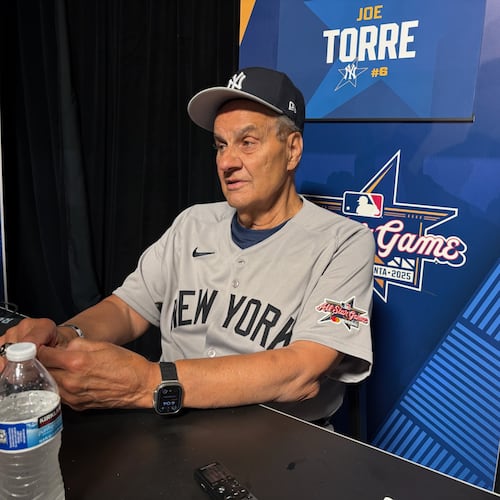When the Braves entered their offseason following their National League Division Series exit, they had four free agents – not including the players with club options on their contracts.
They now have three.
They announced Wednesday that they signed right-handed reliever Pierce Johnson to a two-year contract that guarantees him $14.25 million. It includes a $7 million club option for 2026, with a $250,000 buyout.
The 32-year-old Johnson will make $7 million in each of the next two seasons – the $250,000 buyout is how the guaranteed money becomes $14.25 million.
This move does not come as a surprise. When evaluating the Braves’ roster at the outset of the offseason, bringing back Johnson seemed logical.
He perhaps was the best-performing player in the group of free agents, which also included Joe Jiménez, Jesse Chavez and Kevin Pillar. The Braves had vacancies to fill in their bullpen.
This was an obvious fit for both sides.
Ahead of this year’s trade deadline, the Braves acquired Johnson from the Rockies. He finished the regular season with a 0.76 ERA in a Braves uniform. Put another way: He allowed two earned runs – two! – over 23-2/3 innings, with 32 strikeouts. In the NLDS, he logged three scoreless appearances.
He became one of the Braves’ trusted relievers. Unless his price became too high, it seemed obvious that the team would try to re-sign him.
This deal makes Johnson a main piece of the bullpen for at least the next two seasons. He joins closer Raisel Iglesias and A.J. Minter as the current late-inning options. In addition to Jiménez hitting free agency, Kirby Yates and Collin McHugh have club options, and Brad Hand has a mutual option – and we don’t yet know how those situations will play out. (The Braves have within five days of the conclusion of the World Series to decide on those players.)
Last winter, Johnson signed a one-year, $5 million deal with his hometown Rockies. Before they traded him, he posted a 6.00 ERA over 39 innings for them. His splits at Coors Field – which, because of the elevation, requires pitchers to adjust – were not good. But his stuff always has been there, which seemingly made the Braves confident he could return to form with them.
They were correct.
Johnson is a weapon because of his electric stuff. He has a fastball that averaged 96 mph in 2023, and he pairs it with a devastating curveball.
This past season, Johnson had a 32.5% strikeout rate – the second-best such mark of his career, and good enough to be in the 96th percentile in MLB. His whiff rate (how often hitters swing and miss at his pitches) was in the 91st percentile, his chase rate (how often hitters swing at pitches outside of the zone) was in the 90th percentile.
Johnson made his debut in 2017, for the Cubs. He pitched for the Giants in 2018.
Then he went to Japan.
This was a brief stint: In 2020, he signed with San Diego, where he pitched for three seasons before Colorado gave him a deal. He’s now in Atlanta, where he should have an opportunity to pitch in tons of big games over the next two seasons.
Johnson boosted a bullpen that the Braves thought was talented and deep. The unit finished 11th in baseball with a 3.81 ERA.
Johnson’s deal officially begins the Braves’ offseason. There’s more to come.
In addition to Yates and McHugh, the Braves have club options on starting pitcher Charlie Morton and outfielder Eddie Rosario, which are two intriguing situations to monitor going forward. And as previously mentioned, Jiménez, Chavez and Pillar are free agents. The first two would leave two bullpen vacancies if the Braves don’t bring them back.
But the Braves brought back Johnson, the talented reliever who will continue slotting into the late-inning fold.
About the Author
Keep Reading
The Latest
Featured


